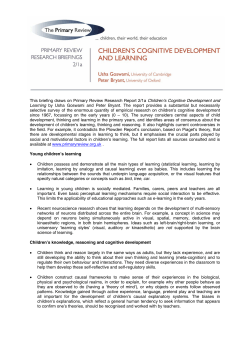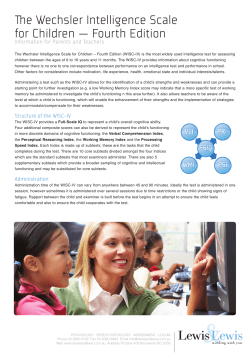
Document 276661
Occupational Services to Industry Independent Assessment Partners Delivering Excellence WAIS IV IQ Report – SAMPLE Confidential Completion Date: DATE Mike Crimes B.Sc. (HONS) M.Sc. C.Psychol C.Sci. AFBPsS Principal Occupational Psychologist PHONE WEB Cognitive Assessment Report 01795590307 WWW.Os2i.org Participant Details Name: Date of Birth: Date(s) of Assessment: Age: Examiner’s Name: Mike Crimes Date of Report: Cognitive Assessment Report 2 Introduction to WAIS The WAIS 4th Edition was used to assess the Intelligent Quotient (IQ) of M. X, age ……. The model of assessment is shown below. Individual Administration and Caveat Assessment of cognitive functioning in Adults Aged 16 – 90 Years. Any interpretation of psychometric instruments should be treated cautiously and, where possible, further validated with other psychological/behavioural evaluations/observations. Scale Composition • • 10 Subtests to Obtain IQ Scores 10 Subtests to Obtain Index Scores Indices and Scales Summary There are four index scores: • • • • Verbal Comprehension Index (VCI) Perceptual Reasoning Index (PRI) Working Memory Index (WMI) Processing Speed Index (PSI) Supplemental subtests may be used to provide additional psychological information or may be used as acceptable substitutes for core subtests. Where these subtests have been used, this will be referenced in analysis with full rationale. Overall, two broad scores are also generated, which can be used to summarise general intellectual abilities: • • Full Scale IQ (FSIQ), based on the total combined performance of the VCI, PRI, WMI, and PSI. General Ability Index (GAI), based only on the six subtests that the VCI and PRI comprise. The GAI provides an estimate of general intellectual ability, with reduced emphasis on working memory and processing speed relative to the FSIQ – this scale is optional. Cognitive Assessment Report 3 WAIS IV Test Structure Verbal Comprehension Scale • Similarities – • Vocabulary – • Information – This subtest measures verbal concept formation and reasoning. This subtest measures word knowledge and verbal concept formation. Perceptual Reasoning Scale • • Visual Puzzles - This subtest measures the ability to acquire, retain, and retrieve information. Supplemental Subtests Comprehension – This subtest measures verbal reasoning and conceptualization, verbal comprehension and expression, the ability to evaluate and use past experience, and the ability to demonstrate practical knowledge and judgment. Working Memory Scale • Digit Span - • Arithmetic - This subtest measures working memory, mental manipulation, cognitive flexibility, rote memory and learning, attention, and encoding. This subtest measures mental manipulation, concentration, attention, short- and long-term memory, numerical reasoning ability, and mental alertness. Supplemental Subtests Letter-Number Sequencing - This subtest measures sequential processing, mental manipulation, attention, concentration, memory span, and short-term auditory memory. Cognitive Assessment Report Block Design - This subtest measures the ability to analyse and synthesise abstract visual stimuli. Matrix Reasoning - This subtest measures fluid intelligence, broad visual intelligence, classification and spatial ability, knowledge of partwhole relationships, simultaneous processing, and perceptual organisation. • This subtest measures nonverbal reasoning, and the ability to analyse and synthesise abstract visual stimuli. Supplemental Subtests Picture Completion - This subtest measures visual perception and organisation, concentration, and visual recognition of essential details of objects. Figure Weights - This subtest measures quantitative and analogical reasoning. Processing Speed • • Symbol Search - This subtest measures processing speed, short-term visual memory, visual-motor coordination, cognitive flexibility, visual discrimination, psychomotor speed, and speed of mental operation. Coding - This subtest measures processing speed, short-term visual memory, learning ability, psychomotor speed, visual perception, visualmotor coordination, and visual scanning ability. Supplemental Subtests Cancellation - This subtest measures processing speed, visual selective attention, vigilance, perceptual speed, and visual-motor ability. 4 Index Definitions Verbal Comprehension: The Verbal Comprehension Index (VCI) is a measure of general verbal skills, such as verbal fluency, ability to understand and use verbal reasoning, and verbal knowledge. Perceptual Reasoning: The Perceptual Reasoning Index (PRI) is a measure of non-verbal and in-the-moment reasoning. It assesses ability to examine a problem, draw upon visual-spatial skills, organise thoughts, create solutions, and then test them. Working Memory: The Working Memory Index (WMI) assesses ability to memorise new information, hold it in short-term memory, concentrate, and manipulate that information to produce some result or reasoning processes. It is important in learning, and achievement. It is important for cognitive flexibility and planning ability, as well as learning and ability to self-monitor. Processing Speed: Processing Speed Index (PSI) assesses skills focusing attention and quickly scanning, discriminating between, and sequentially ordering visual information. It requires persistence and planning ability, but is sensitive to motivation, difficulty working under a time pressure, and motor coordination. Cognitive Assessment Report 5 Comparison and Interpretation Verbal Comprehension Superior Verbal Comprehension 1. The ability to work with abstract symbols. 1. The person has a high degree of education. 2. The amount & degree of benefit a person has gathered from their education. 2. Psychomotor slowing due to depression. 3. 3. Memory: verbal ability. The person may have a tendency to overachieve. 4. Verbal fluency. 4. The person may have difficulty working with practical tasks. 5. Poor visual-motor integration. 6. A slow, deliberate work style. This will produce higher scores of the verbal tests than the perceptual tests. Perceptual Reasoning 1. The degree and quality to which an individual makes non-verbal contact with the surrounding environment. 2. The capacity to integrate perceptual stimuli. Superior Perceptual Reasoning 1. Superior perceptual organisation abilities. 2. Very good at working under time constraints. 3. A tendency toward low academic achievement (e.g. a doer and not a thinker). 4. The presence of a language deficit (e.g. learning disability). 3. The ability to work quickly in concrete situations. 4. The ability to interpret visual-spatial stimuli. Assessment Appearance and Behaviour During Assessment M. X arrived promptly to undertake the cognitive assessment. S/he was casually dressed. S/he maintained assertive eye contact, answering questions clearly and confidently. Her/his mood and effect were calm and jovial. During the assessment s/he remained concentrated and compliant, so rapport was established easily. S/he maintained motivation throughout the assessment. The testing environment was conducive to effective performance in the various tasks, i.e. there were no distractions such as outside noise and there were no interruptions to the assessment. There were no barriers to the assessment in terms of language, i.e. English is her/his first language. Cognitive Assessment Report 6 Cognitive Assessment (IQ) Numerical Results Since chance factors such as variations in a person’s performance over time can influence any cognitive assessment, it is more accurate to speak in terms of a range of scores when assessing a person’s level of cognitive functioning (see Confidence Interval column below). Taking these factors into account, the probability that M. X’s true IQ score falls within the ranges stated below is approximately 95 out of 100. Score IQ 95% Confidence Interval Percentile Classification Full Scale IQ 1. M. X’s Full Scale IQ is at the … percentile; meaning … of her/his norm group, i.e. … year olds would score above this score. Index Assessment Verbal Comprehension Perceptual Reasoning Working Memory Processing Speed IQ/Index Score Percentiles Confidence Intervals Score Verbal Comprehension IQ Classification Perceptual Reasoning Working Memory Processing Speed 1. M. X’s Verbal Comprehension Index is at the … percentile; meaning … of her/his norm group, i.e. … year olds would score above this score. 2. M. X’s Perceptual Reasoning Index is at the … percentile; meaning … of her/his norm group, i.e. … year olds would score above this score. 3. M. X’s Working Memory Index is at the … percentile; meaning … of her/his norm group, i.e. ... year olds would score above this score. 4. M. X’s Processing Speed Index is at the … percentile; meaning … of her/his norm group, i.e. … year olds would score above this score. Cognitive Assessment Report 7 Working With M. X Verbal Comprehension Summary M. X’ verbal comprehension is … The primary factor in poor comprehension for most adults is inadequate word identification skills. It is very likely this will impact M. X’s interpretation of sentences. Research indicates that individuals who have adequate word identification skills but poor comprehension usually have some impairment in language comprehension that includes listening as well as reading comprehension. M. X may exhibit problems in relation to: • • • • Letter and word recognition. Relating some words and ideas. Reading speed and fluency. General vocabulary skills. M. X may: • • • • Often misread information. Have problems with syntax or grammar. Have difficulty writing ideas and/or organising thoughts on paper. Have problems with sentence structure, writing mechanics and organisation. 1. 2. 3. Repetition will be important when presenting written materials, especially complex written materials. Comprehension strategies may be necessary to help support M. X’s understanding of written material. Monitoring and checking her/his comprehension and understanding through questioning will be important when interacting with M. X. Overall, close monitoring and support will be necessary in order to ensure M. X fully understands information presented to him/her, either verbally or in writing. 4. Perceptual Reasoning Summary M. X’s Perceptual Reasoning Index (PRI) is … The PRI is designed to measure fluid reasoning in the perceptual domain, and uses visual organisation and coordination, as well as assesses the ability to separate figure and ground in visual stimuli. Perceptual reasoning is unaffected by educational background. People with high perceptual reasoning tend to be very good at assembling furniture and other objects, map reading, drawing designs, and overall demonstrating a stronger practical orientation. Contrastingly, people who demonstrate low perceptual reasoning scores often have problems driving from one location to another, estimating distances, drawing accurate designs and assembling objects. M. X perceptual reasoning skills are … Given her/his performance in this area, it is likely M. X will have as strong a practical orientation as most people, and demonstrate some competence in relation to practical tasks involving visual judgment and visual problem solving. M. X is also likely to show some adeptness in relation to tasks requiring visual learning and adaptation. Working Memory Summary Working memory is important because it provides a mental workspace in which we can hold information whilst mentally engaged in other relevant activities. The capacity to do this is crucial to many learning activities. Cognitive Assessment Report 8 M. X’s working memory is … People with small working memory capacities will struggle with certain activities, simply because they are unable to hold in mind sufficient information to allow them to complete the task. Losing crucial information from working memory will cause them to forget many things: instructions they are attempting to follow, the details of what they are doing, where they have got to in a complicated task, and so on. Given her/his … working memory, M. X is likely to forget instructions as much or as little as most people and this is unlikely to cause him/her major issues when learning and understanding new tasks or instructions presented to him/her. Potential behavioural manifestations when working with M. X could include: • • • Moderate difficulty starting and following through with complex goals and projects. Moderate difficulty remembering complex instructions. Occasionally interrupting conversations to check understanding. Processing Speed Processing speed involves the ability to automatically and fluently perform relatively easy or over-learned cognitive tasks, especially when high mental efficiency is required. That is, for simple tasks requiring attention and focused concentration. It relates to the ability to process information automatically and therefore speedily, without intentional thinking through. M. X’s processing speed is … and, when coupled with her/his … working memory, is likely to work as fluently and automatically as most people, working efficiently at times and at other times requiring support. Given her/his … perceptual reasoning, it could be argued s/he may be quite fluent and automatic with practical day-to-day tasks, and should learn and adapt well in relation to instructions given in relation to practical tasks. On occasions, s/he may take more time to: • Make more complex decisions when under pressure. Opinion M. X is likely to work less efficiently with written or verbal information, and checking her/his understanding of more complex material through questioning will be important. S/he may also need support, on occasions, with planning arrangements and goal setting and require more complex goals and instruction to be broken down, to allow staged achievement. M. X will have as strong a practical orientation as most people, and demonstrate some competence in relation to practical tasks involving visual judgment and visual problem solving, and with practical tasks requiring spatial or diagrammatical problem solving. Overall, s/he should learn and adapt well in relation to tasks presented, if given sufficient motivation support. On occasions, s/he may take more time to make more complex decisions when under pressure. In general terms, and in relation to M. X’s cognitive profile, the following may assist and drive self-managed learning and selfimprovement in relation to personal change. • • • • • • • Help M. X with planning arrangements, i.e. so s/he can feasibly attend appointments/activities. Help M. X develop a system for documenting and planning day-to-day living activities. Assist M. X in writing down improvements to be shared at appointments. Use either/or questions rather than yes/no questions. This leads to improved development through choice. Let M. X practice new skills and/or role-play situations. Ask M. X to repeat back instructions in her/his own words. Help M. X think of examples from her/his own experience that connect to what you are exploring. Cognitive Assessment Report 9 • Connect M. X with other parents in terms of parameters you are exploring. Mike Crimes – Competence Certification & Professional Narrative B.Sc. (Hons) Applied Psychology – Liverpool. M.Sc. Occupational Psychology – Hertfordshire. Full member of the Division of Occupational Psychology. Entry on the Register of Chartered Psychologists. Chartered Scientist. Practicing Certificate from the Health Professions Council. Eligibility for Associate Fellow Status. Certificate of Competence in Occupational Testing, Level A & B – Progressing towards Assessor Status. Consultant practitioner across the following Level B Instruments - 16PF5, 15FQ, MBTI, CAL, HJ17, OPQ32, MTQ48, PROFILES, SAFEPQ, WAVE, FIRO-B. Registered Level A test user with ASE, AQR, OPP, Psytech International, SHL, Test Agency, Psychological Corporation and OPC. European Test User Certified across 35 European Countries. Principal Member of the Association of Business Psychologists. Mike Crimes is a Principal Business Psychologist. He has been on the UK leading specialist register across four global areas of Occupational Psychology since 1999, and is a Principal Member of the Association of Business Psychologists. He is the founding partner of Os2i, where the primary goal is to help individuals become aware of their own potential through assessment practice, in order to optimise their effectiveness. He is also the author of ADEPT® – Assessment and Development Event Portfolio for Talent. He has over eighteen years experience in psychometric profiling across Public and Private sector organisations, covering a wide range of ability and behavioural characteristics. He has extensive knowledge of culturally fair psychometric assessment, structured observation and interviewing techniques. He has further specialist expertise in occupational interests, behavioural assessment, emotional intelligence, mental toughness, and team and relationship profiling. Mike has worked successfully within CAFCASS, and with senior Social Workers across Local Government Children’s departments where ‘Ofsted Improvement Notices’ have been served. Mike has operated as a senior business practitioner, working for over seven years as Head of Occupational Psychology Services for the Carlisle Group, where he was also Principal Consultant for Psychometrics across the business group. In the legal sector, Mike’s expertise may be of particular value in relation to cognitive assessments and the areas of memory, attention, and problem solving. Mike is also working in the Occupational Health arena undertaking fitness for work assessments from an Occupational Psychology perspective, looking at cognitive capability, behavioural capability, and environmental/cultural fit. From a strategic perspective, Mike has over fifteen years organisational development experience, focusing on individual, team and organisational performance, as well as over fifteen years experience of designing and implementing assessment and development centres across central government and FTSE 100 companies. Within these broad business environments, he has served as a senior business partner responsible for the development of actionable talent management strategies and solutions aligned with strategic HR objectives. He has been directly involved in talent planning, Cognitive Assessment Report 10 acquisition, retention, learning and development strategies to support a culture of high performance. He has used extensive psychometric practice to support behaviours required for individual, team and organisational success. He has extensive understanding of business goals in the current economic climate and applies a wealth of Business Psychology expertise to aligning people to business objectives. This is achieved through engaging in a consultative manner with multiple stakeholders delivering change, employee engagement, resourcing and wellbeing solutions in the UK and across Europe. Specialties Summary • • • • • • • • • • • • • Psychological profiling for recruitment and development. Cognitive assessments. Inclusive talent management. Designing competency/behavioural models. Leadership and interpersonal skills development. Wellbeing at work coaching and mentoring. Conflict management. Skills gap analysis. Assessment and development centres. Performance management solutions. Organisation effectiveness and change management. Identify, develop and track potential. Succession planning. Mike can also be contacted via LinkedIN – Os2i. www.Os2i.org END Cognitive Assessment Report 11
© Copyright 2025












